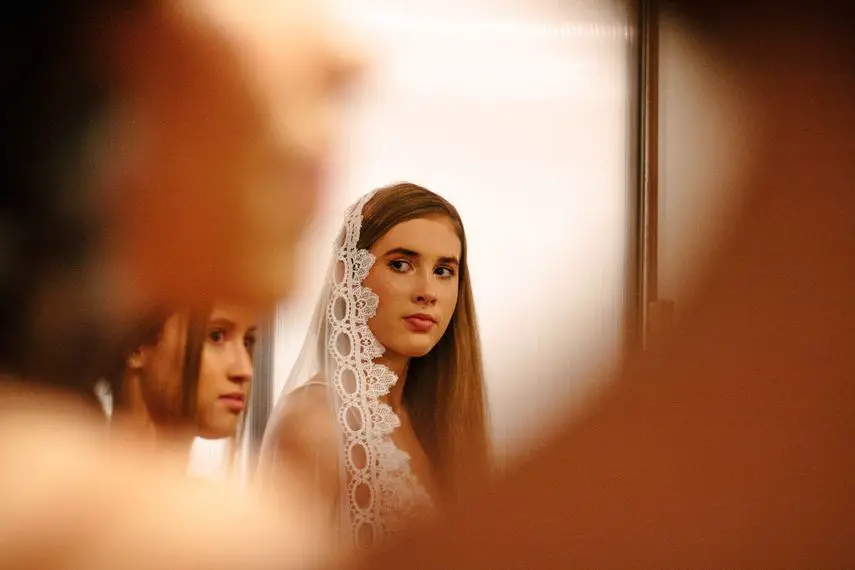If you’re like me and you’ve been sitting at many weddings asking yourself, why are we still doing this [insert particular tradition]… Isn’t this kind of outdated?? THEN let’s explore the possibility of patriarchal wedding traditions that may no longer be relevant!
I had never quite been able to say why xyz tradition didn’t feel right, but the more I think about it, the more I think it has something to do with the original purpose behind many of these traditions.
The traditions no longer seem to fit the modern purpose that they are serving, as described so awesomely in TED Talk speaker Priya Parker’s book The Art of Gathering: How We Meet and Why it Matters (follow this link to check out the prices on Amazon).
Traditions connect us to those around us, but sometimes they seem to be in contradiction with our modern beliefs and values. And this really rears its head during a modern wedding ceremony.
In this article, I’ll talk about the # outdated and patriarchal traditions that many of us are still doing at weddings, despite the modern and forward-thinking people that we are.
I couldn’t stop thinking about this topic and even made a short video about in on my wedding YouTube channel:
Much of the problems I point out here can be witnessed in heterosexual weddings. I’ve found that when we look to the weddings of queer couples, we’re forced to face the sexist traditions apparent in heterosexual weddings. For example, a queer couple may think to negotiate last-name-changing more quickly than a heterosexual couple, many of whom make an automatic assumption that if anyone is to change their last name, it will be the woman.
This is a controversial topic, so I suppose I begin this list with the disclaimer that not everyone will agree with me, and that it is TOTALLY OKAY to like and to do these traditions if that’s what you’re into!
I only hope to persuade us all to honestly ask ourselves the real reason behind why we are deciding to perpetuate these traditions.
ALSO THESE EXAMPLES ARE OF COURSE CULTURE-SPECIFIC, and DO NOT apply to ALL cultures (obviously!).
#13 Taking the groom’s last name
When I was dating my long-term, now ex-boyfriend in college, there was a moment when he expressed that it was important to him that his future wife would take his name when he married. I remember being crestfallen, confronted for first time by the idea of someday maybe having to change my name, which I guess I’d never thought about before. And then feeling very, very uncomfortable with it… but not knowing why (We later broke up!).
In my current relationship, many people have asked, and many people have assumed, that I would change my last name after getting married. It’s almost like people don’t think you’re taking your marriage seriously, or that you don’t care as much, if you aren’t changing your name.
But this is a tradition and a frame of mind, not an imperative. And it hasn’t been around forever, nor does it exist in every culture.
We like to think of ourselves, as North American women, as being free and equal to men in many ways, especially compared to women in other parts of the world. With a touch of humility, we might see that WE have a lot to learn from other cultures.
Taking the husbands’s name, in heterosexual relationships, is still a common practice in North America, but I have learned from friends (and travels) that this is not so in many other countries.
And the reasons for taking the husband’s last name are sexist in origin (source). It was a way of showing that the woman was the husband’s property and that her “maiden” identity would now be shifting to being part of the man’s identity. Modern heterosexual women still overwhelmingly take their husband’s last names, while the men almost never change theirs.
This in spite of the paperwork hassle, as well as the loss of identity that can cause trouble for women professionally and personally (think of contacts you search for on social media but no longer recognize since their wedding day and subsequent name change).
#12 The wording in traditional ceremonies
The language we use to conceptualize things in life is important. The words that we use tell us subconsciously how we feel about situations as a culture.
When we ask our dad to “give us away” at the end of the aisle, this brings about an image of being “gifted” from one man to another. If we want our dad to walk us down the aisle, we might think about changing the words “give away” to something less patriarchal.
There are too many examples of these sort of “language” issues to name.
At the end of the ceremony, something as seemingly innocent as “[Groom], you may kiss your bride” gives all the permission to the man to kiss his bride, but none to the bride. It’s something so small, but it does tell us a lot about our values.
Bottom line: Carefully consider the language that’s used in your wedding ceremony and how you might strive to make it more equal.
#11 Not seeing each other all night and day before the ceremony/”First Look”
It’s tradition to spend the night before your wedding apart from your future spouse.
On the morning of your wedding, you get ready separately, and don’t see your partner until you’re either walking down the aisle, OR doing a “first look” (usually captured by your photographer).
The reason I put this tradition on THIS list is because it has sexist origins.
Traditionally, couples were kept separated from one another because families did not want either party to see each other and BACK OUT of the wedding. Weddings were almost always arranged, with the couple having no say in the matter (especially the woman).
These days, I don’t think most couples realize the problematic origins of this tradition. Many couple just do it for fun and the surprise factor.
But just know that you don’t HAVE TO do this tradition if it makes you anxious, or if you just want to spend the night before and the morning of your wedding with your partner. It’s really okay.
#10 Women getting ready all day while the men hang out and drink
Okay, sure, this one is on the list just because I’m bitter! HA. But really.
I’ve been a bridesmaid or a “dedicated helper” at weddings where I’ve seen all the women of the family doing ALL the work to prepare for the wedding in the days leading up to the wedding and on the day of.
Which is fine. Many of us WANT to and enjoy doing these preparation tasks. But the problem in my mind arises when I see the men doing nothing.
When the men are off somewhere drinking or playing golf while the women do all the work, it feeeeeels a little sexist.
#9 Asking the father’s permission
I believed that this was the “thing to do” when I was younger (i.e., in my early twenties when some of my friends were getting married).
But as an older, wiser (hehe) 30-something, I recognize the problems with this expectation. Asking for the permission to marry a woman (even just symbolically) from anyone but the woman… is patriarchal.
Even if we change the wording to “asking for a blessing” from the woman’s parents, there is no equivalent for the woman. The woman is not expected to ask her boyfriend’s parents for their blessing. It only goes one way. Where is the equality in this tradition?
A more equal way to do this would be for both the man and the woman to ask for a blessing from either set of parents. Or just to ditch this tradition all together.
#8 Father “giving away” the bride
I talked about this already, but I think it deserves its own headlines as well.
Calling this tradition “giving away” harks back to olden days when the bride was literally “given” from her father to her new husband, whether she wanted to marry him or not.
If you just want your dad to walk you down the aisle because you think it’s a nice moment to have together, then call it that. Don’t call it “giving away” the bride.
Other alternatives include: Walking down the aisle with both of your parents, with your stepparents too, or hand-in-hand with your fiance!
#7 Garter and bouquet toss
This one is interesting. A popular wedding tradition is for the bride to throw her bouquet to a crowd of single (female) guests, and the one who catches it is said to be the next to get married.
The equivalent to this is supposed to be the groom throwing his bride’s garter (which he first retrieves from underneath her wedding dress)… and then he throws the garter into a crowd of (single) men.
The problem here is that the two activities aren’t equal. The woman doesn’t throw the groom’s underwear into a crowd of women. She doesn’t take off his underwear in front of his grandmother.
It’s also a bit tricky to gather and single out a group of single people, who may be perfectly fine being single, and not really wanting a bunch of strangers at a wedding to put expectations (even in jest) on them to get married.
If you want to learn more about garter tosses, check out my YouTube video on the subject:
#6 Bride’s family paying for the wedding
This tradition straight up sucks. Back in the day, in some cultures, the woman’s family would be expected to pay a bride price or a dowry in order for the husband’s family to accept her (and take her off her family’s hands).
Women were considered a burden to care for and a woman’s family would work hard to see her married off. Another reason that SONS were considered to be more valuable.
So this is a pretty crappy origin story and NOT a tradition that you want to perpetuate.
Figure out who’s going to pay for what, but don’t expect the bride’s parents to pay for anything.
#5 Engagement ring
The patriarchy negatively affects men as well. Some people don’t realize this.
We expect men to spend a fortune on an engagement ring (“three month’s salary” — which is a joke and was invented by diamond companies to sell more expensive diamonds).
We put men in a financial hole right from the start, while the woman is not expected to pay for any short of expensive jewelry. We judge men on their ability to spend money on the right ring. We say things like “Oh, he did well!” when we see the ring.
When if we’re being critical and honest… This is just another unequal, unfair part of wedding planning.
#4 Waiting to be proposed to
Men propose to women in probably 99 percent of heterosexual couples. (Including us!)
But why?
Why is it expected for the man to propose? And why the pressure for it to be “perfect”? A planned, often expensive production?
A more equal world would see a shift in expectations, and more women making the effort to do the asking.
#3 Bridal showers
I’ve written about my issues with bridal showers before. This is a tradition that no longer serves its original purpose.
Traditionally, bridal showers did not include men. And still, many showers have an all-female guest list and often the groom doesn’t attend.
There is no equivalent for grooms.
What this says is that the bride needs to receive gifts and get prepared for marriage but the groom doesn’t.
A more equal way to go about this kind of event might be the more modern iteration often just called a “wedding shower.”
A wedding shower might have an all-inclusive guest list in terms of gender, and of course, the groom would attend as well.
#2 Gender-Divided Wedding parties
If most of your friends are women and most of your fiance’s friends are men, sure a gender-divided wedding party is fine.
But if you have close friends that you want in your wedding party, why do we limit ourselves with these archaic expectations of gender-divided wedding parties?
I have three brothers — why can’t they stand next to me instead of next to my partner? Why do we always have to divide everything up into girls and boys for weddings??
#1 Bachelor and bachelorette parties
This one is hard to change minds about. And I understand that people want to spend some quality time with their “girls” or their “boys.”
But here is one of my issues with bachelor and bachelorette parties:
There’s a opt-repeated sentiment of “this is your last night of freedom!” implying that there’s some cataclysmic shift that happens in a couple when they get married. Like there’s a strict before and after, which I don’t believe it.
If you’ve been having so-called “nights of freedom” while in a relationship, but you think this is suddenly going to stop once you get married… that seems like a problem.
What other wedding traditions do you find sexist? Do you agree with this list? Let me know! 🙂




